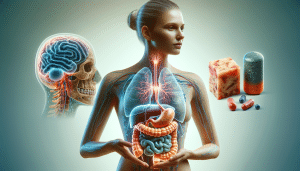Secrets You Never Knew About Gut Health
Ella Knight September 27, 2025
Unlock the hidden influences of your digestive system and see how gut health affects everyday wellness, mood, and vitality. This guide reveals the microbiome’s fascinating role, the signs of imbalance, and lifestyle tips for thriving from the inside out.
Why Gut Health Matters More Than You Think
The gut has been called the body’s “second brain” for a reason. It does much more than digest food—it helps support your immune system, processes essential nutrients, and influences emotions and cognitive function. When the gut is out of balance, it shows in many surprising ways. Studies have found links between digestive health and issues like sleep disturbances, low energy, and even mental fog. Everyday choices, from diet to stress management, play a crucial role in shaping gut wellness (Source: https://www.nih.gov/news-events/nih-research-matters/gut-bacteria-linked-powerful-immune-system).
Think of the gut as a miniature ecosystem. Trillions of bacteria and microbes, collectively known as the gut microbiome, work together to support digestion, immunity, and even metabolic rate. When this community is disturbed, it becomes harder to break down foods or absorb vitamins. This imbalance is sometimes called dysbiosis and may contribute to discomfort, mood swings, or skin issues. Research suggests that the diversity of microbiota in your belly is deeply connected to your long-term health, affecting everything from cholesterol to blood sugar.
Most people aren’t aware that gut health can impact how the brain functions too. The gut communicates with the brain through nerves, hormones, and even immune signals. This constant chatter is called the gut-brain axis. When inflammation or imbalance occurs, it may result in subtle changes in mood, stress resilience, or overall motivation. Taking simple steps—like eating more fiber, minimizing processed foods, and managing stress—can all foster a healthier gut ecosystem and make a meaningful difference in daily well-being.
Recognizing the Signals of an Unhappy Gut
Gut health sends out hints long before discomfort becomes obvious. Early signals might include bloating after meals, frequent heartburn, or a sense of heaviness in the abdomen. Subtler clues might be bad breath, food intolerances that develop over time, or random cravings for sugar and processed foods. These issues are often overlooked, but paying attention to them could mean a smoother, healthier journey ahead (Source: https://www.niddk.nih.gov/health-information/digestive-diseases).
There are plenty of signs unrelated to digestion that have roots in your gut environment. Chronic fatigue, headaches, and even joint pain sometimes trace back to inflammation starting in the digestive system. When gut bacteria are out of balance, they can trigger immune reactions through the body. This can manifest as skin breakouts, eczema, or unexplained rashes. Some people notice changes in mood, feeling anxious or blue without a clear cause. These signals reflect the gut’s broad influence over physical and mental health.
Noticing new symptoms? Keep an eye on patterns rather than isolated events. For example, frequent colds, unexplained soreness, or changes in sleep patterns may point toward underlying imbalances. Experts recommend monitoring any unusual changes and exploring adjustments like keeping a food diary or noting lifestyle shifts. Taking care to notice and interpret these early signs is one of the best ways to take control of your wellness journey and address imbalances before they affect quality of life.
The Microbiome’s Role: How Tiny Organisms Shape You
The gut microbiome is a vibrant community of bacteria, viruses, and fungi working together to protect and nourish the body. These microorganisms break down food, create vitamins, and even guard against harmful invaders. Maintaining a healthy microbiome means fostering diversity—the wider the variety of good bacteria, the more resilient the gut becomes. Changes in diet, medications, or chronic stress can disrupt this balance, making it more important than ever to pay attention to daily choices (Source: https://medlineplus.gov/gutmicrobiome.html).
One fascinating aspect of gut health is its ability to influence metabolism and weight regulation. Certain bacteria are linked with easier weight management, while others may be associated with greater tendencies toward weight gain. This isn’t about a single “miracle” food—it’s the cumulative effect of many factors, including fiber intake, variety in fruits and vegetables, and limiting unnecessary antibiotic use. Over time, these factors create a gut environment that encourages robust health and naturally supports energy levels.
New science is uncovering links between the gut microbiome and the immune system. Approximately 70% of the body’s immune cells are located in or near the digestive tract. This means the gut is a command center for defending against viruses, allergens, and toxins. When the microbiome thrives, the immune system works more efficiently. But when imbalance sets in, immune responses can become confused, sometimes resulting in chronic conditions or recurring infections. Cultivating a diverse, happy microbiome is one of the soundest investments in personal health.
Everyday Habits That Nourish Your Gut
Building daily routines that enhance gut health is easier than you might think. Simple practices—like eating a variety of high-fiber foods, drinking plenty of water, and reducing processed sugars—can have dramatic results. Fermented foods such as yogurt, kefir, sauerkraut, and kimchi supply the body with beneficial probiotics, which are living organisms that add to gut diversity (Source: https://www.hsph.harvard.edu/nutritionsource/probiotics/).
Exercise and restful sleep are also key players in balancing the digestive environment. Physical activity helps move food through the intestines and supports regularity, while quality sleep gives your gut time to repair and reset. Experts suggest aiming for at least 7 hours of rest each night and incorporating moderate movement—like brisk walking or cycling—into your week. This combination helps maintain digestive momentum and strengthens resilience to stress signals from the brain.
Stress itself is a well-known disruptor of gut health. Practicing mindfulness techniques such as deep breathing, gentle yoga, or guided journaling can calm the nervous system and support digestive wellness. Limiting alcohol and caffeine, managing work-life balance, and spending time outdoors all contribute to a happier microbiome. Building these small habits may offer cumulative benefits, supporting overall health well beyond the gut itself.
Understanding Prebiotics, Probiotics, and Postbiotics
Gut health relies on three categories of nutrients: prebiotics, probiotics, and postbiotics. Prebiotics are fibers found in foods like garlic, bananas, onions, and oats. They feed beneficial bacteria and help them flourish. Probiotics are live bacteria found in fermented foods, adding important strains to your internal community. And postbiotics are the beneficial byproducts these bacteria create—think of them as health-promoting compounds that result from healthy gut activity (Source: https://www.mayoclinic.org/healthy-lifestyle/nutrition-and-healthy-eating/in-depth/probiotics/art-20045336).
Foods rich in prebiotics set the foundation for sustained digestive wellness. Leafy greens, whole grains, and artichokes provide a steady supply of fuel for friendly microbes. On the other hand, probiotics deliver a temporary but powerful influx of beneficial organisms that help with everything from breaking down lactose to calming irritated bowels. When the gut’s population is supported by a mix of these foods, resilience improves and digestion typically becomes more comfortable.
Postbiotics—though lesser known—play a critical role in gut health. These are compounds such as short-chain fatty acids, which benefit the gut barrier and regulate inflammation in the body. Regular intake of both prebiotic and probiotic foods encourages higher levels of beneficial postbiotics. While supplements exist for all three, nutritionists recommend focusing on a varied, whole-foods diet as a primary strategy for a robust and self-supporting microbiome.
Gut Health Myths and What Research Really Says
There is plenty of misinformation about gut health out there. One common myth is that all bacteria are harmful and should be eliminated. In reality, most gut bacteria are either beneficial or neutral, and only a small portion cause problems. Another misconception is that detox diets or cleanses are necessary for a healthy gut, when, in fact, rapid changes can sometimes upset the balance of your microbiome (Source: https://www.ncbi.nlm.nih.gov/pmc/articles/PMC5641835/).
Another myth is that a single superfood or supplement can “fix” gut health overnight. The reality: gut ecosystems improve through consistent habits over weeks and months. It’s also important to note that antibiotics, while medically necessary at times, can impact both good and bad bacteria, so supporting your gut before and after antibiotics makes sense. Slow, steady changes in diet and lifestyle are typically the most effective for fostering resilience.
Research is ongoing and science is still learning about the full impact of the microbiome. However, there’s agreement on the fundamentals: variety in the diet, a mix of pre- and probiotics, regular movement, and mindful stress management are crucial. If you ever feel lost in myths or “quick fixes,” consulting reputable research and talking with a registered dietitian can provide clear, actionable steps grounded in real science.
References
1. National Institutes of Health. (n.d.). Gut bacteria linked to powerful immune system. Retrieved from https://www.nih.gov/news-events/nih-research-matters/gut-bacteria-linked-powerful-immune-system
2. National Institute of Diabetes and Digestive and Kidney Diseases. (n.d.). Digestive Diseases. Retrieved from https://www.niddk.nih.gov/health-information/digestive-diseases
3. MedlinePlus. (n.d.). Gut Microbiome. Retrieved from https://medlineplus.gov/gutmicrobiome.html
4. Harvard T.H. Chan School of Public Health. (n.d.). Probiotics. Retrieved from https://www.hsph.harvard.edu/nutritionsource/probiotics/
5. Mayo Clinic. (n.d.). Probiotics: What you need to know. Retrieved from https://www.mayoclinic.org/healthy-lifestyle/nutrition-and-healthy-eating/in-depth/probiotics/art-20045336
6. National Center for Biotechnology Information. (2017). The human gut microbiome – a new frontier in pharmacology. Retrieved from https://www.ncbi.nlm.nih.gov/pmc/articles/PMC5641835/







